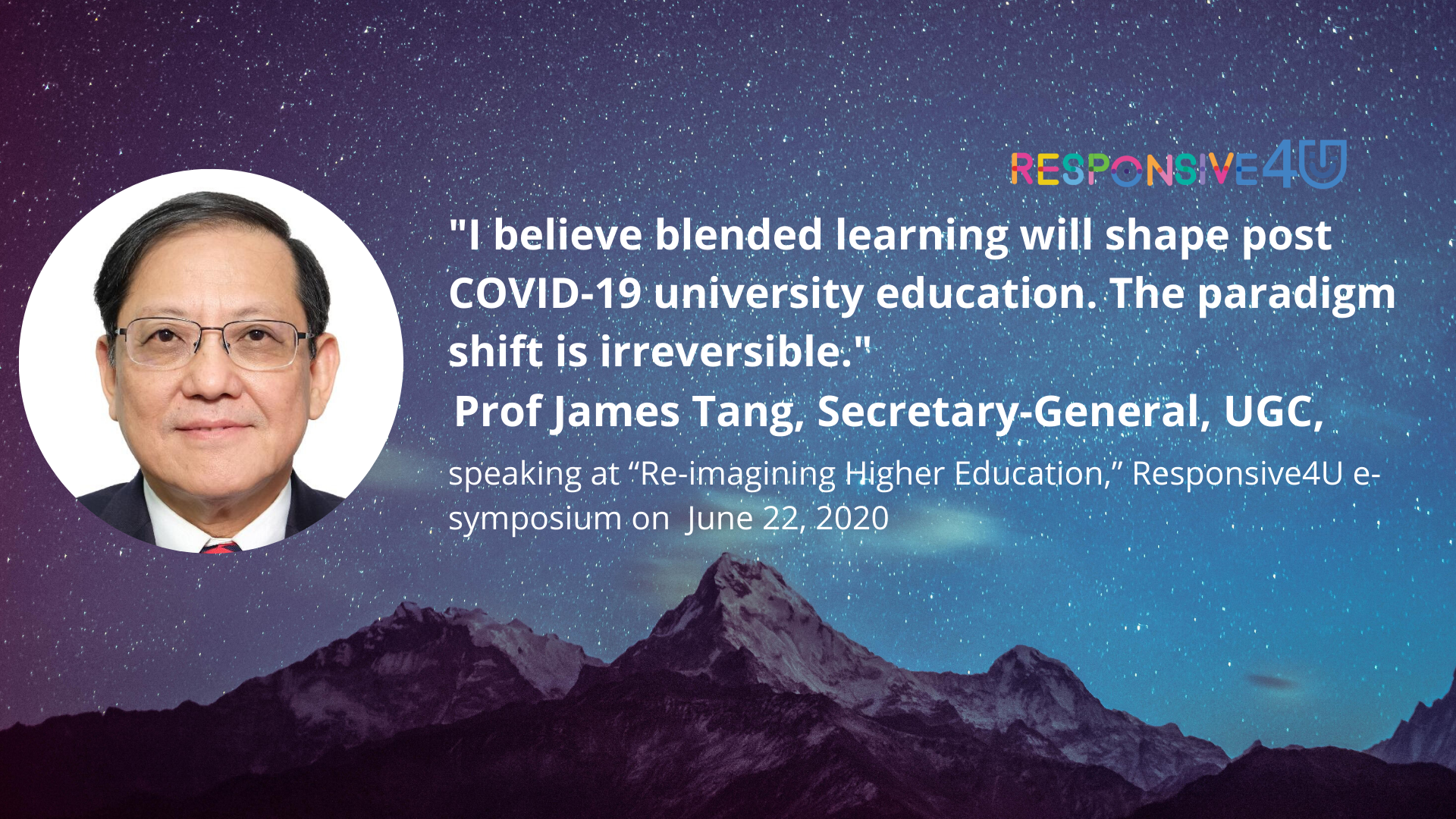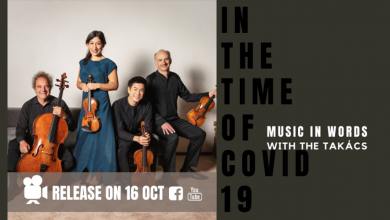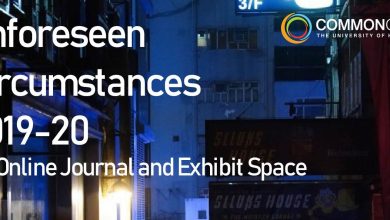The Paradigm Shift is Irreversible
Prof James Tang, Secretary-General, University Grants Committee, Hong Kong

Speech delivered at “Re-imagining Higher Education,” Responsive4U e-symposium
June 22, 2020
I’m truly delighted today to join this very fruitful conversation upon the completion of the Responsive4U project. And thank you, Andrea, for hosting this symposium.
First, I would like to offer my warmest congratulations to everyone involved in the project from the four universities for these remarkable achievements. And in particular, our project leader Professor Ricky Kwok and the six co-leaders, Professor Isabella Poon and Dr. Wong Wing-hung from CUHK, Professor Chetwyn Chan from PolyU, Professor Chang Chih-Chen and Professor Roger Cheng from HKUST and also Professor Gray Kochhar-Lindgren from HKU.
It is really impressive to have over 2,000 students enrolled in these shared courses under this project. The course packages which are shareable among participating institutions and a wider group of stakeholders are of truly high quality. I’m pleased to learn the very positive feedback from those who have taken part in this worthwhile initiative.
Coping with the Disruptive Impact of COVID19
You mentioned that the UGC funded this project a couple of years back. Obviously, when we decided to fund the project, we had absolutely no idea how the spread of a new virus in the form of COVID-19 would have disrupted the higher education sector to such an extent. As one observer put it, “for most people throughout the world, it does seem like the world as we knew it has hit the pause button now”. Many are also predicting that the world will be forever different. And a new normal with mask wearing, social distancing, restrictive travel measures, and more frequent online meetings has emerged and is likely to become part of everyday life. Professor Ian Holliday just earlier mentioned the kind of changes the universities would have to introduce to manage all these new developments.
Pandemics are, by their nature, always disruptive to human society. We know during the Black Death in the second half of the 14th century, medieval universities were devastated. Many students and lecturers, for example, in Oxford and Cambridge, fled when the disease spread to the university towns. But the students and their teachers still found ways of managing the situation with escape plans. And even before the pandemic was over, four new colleges were established in Cambridge and student enrollment increased in Oxford. In many ways COVID-19 is more all encompassing in its disruptive impact than previous pandemics and the implications for those of us in higher education is likely to be far-reaching. A recent commentary in the South China Morning Post suggested that the COVID-19 pandemic had “rocked the foundations of universities as a critical sector of our economies, and created a crisis for millions of millennials who see their future livelihoods in jeopardy”.
Blended learning will shape post COVID-19 university education
The Responsive University Project addresses a number of key issues on the challenge of quality learning experiences for our higher education sector, even the technological changes, and the rapidly evolving social and economic environment that took place even before COVID-19 hit us. Universities all suffered during previous pandemics, but they have re-emerged as institutions that help our understanding of the world around us with science and knowledge. They have also become institutions that serve wider segments of society and at the forefront in the promotion of technological innovation, economic growth, better understanding of human societies and also in nurturing leadership for communities around the world. How universities will emerge from the current epidemic is going to be really crucial for the future of human societies. With COVID-19, there is unprecedented interest in e-learning among educational institutions worldwide. The need for sharing quality content as we turn to e-learning is global, from webinars to online streaming of musicals and plays. The world has really embraced the idea of sharing without physical or institutional boundaries almost overnight. I believe blended learning will shape post COVID-19 university education. The paradigm shift is irreversible.
I’m truly excited this morning when I heard so many bright minds sharing their visions on how education can become more responsive in the digital era. The discussion was fruitful and enlightening for me. And this symposium has inspired all of us to think about the delivery of education in the post-COVID era. I’m sure the successful conclusion of the project will be a very important milestone for more extensive and deeper collaboration among universities in Hong Kong, for new thinking on learning and the impact of this project will be lasting for many, many more years to come.
Promoting an ecosystem for excellence in teaching and learning
As you know, the UGC has always been enthusiastic when it comes to teaching excellence. We certainly are happy to support this meaningful, collaborative endeavor under our funding scheme for teaching and learning. The funding scheme started in the 2012-15 triennium provided extra resources to universities. It has been successful in bringing pedagogical changes and innovations. Another round of funding scheme in the 2016-19 triennium with about $178.9 million was further allocated to the universities. I’m glad to see that the seeds planted a couple of years ago have started to bear fruits. Even with all these achievements, we know you want to do more. And that is why we provided 50% more funding for the UGC Teaching Development and Language Enhancement Grant in the 2019-22 triennium, bringing the grant amount to $781.2 million. We hope that our message for supporting teaching and learning is clear, and that our support can make a difference to the higher education landscape here in Hong Kong.
Obviously, we would like to see each other face to face and physical interaction is important in university education. I’m sure the trend for blended learning and flipped classrooms, which started well before the disruption brought about by COVID-19 will become more widely adopted. Now that both teachers and students are more skilled at interacting online and are more appreciative of the use and limitations of such platforms.
The UGC is happy to continue our support for innovative ways in the promotion of an ecosystem for excellence in teaching and learning for the sector. I’m truly pleased to see such a successful completion of the Responsive4U project.
Thank you so much.



